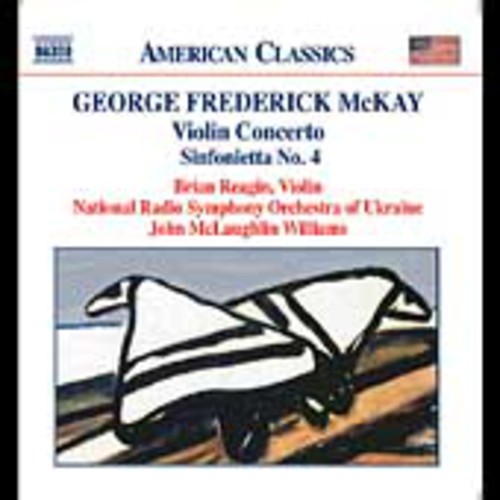Show results for
Deals
- 4K Ultra HD Sale
- Action Sale
- Alternative Rock Sale
- Anime sale
- Award Winners Sale
- Bear Family Sale
- Blu ray Sale
- Blu ray Special Editions
- Blues on Sale
- British Sale
- Classical Music Sale
- Comedy Music Sale
- Comedy Sale
- Country Sale
- Criterion Sale
- Electronic Music sale
- Hard Rock and Metal Sale
- Horror Sci fi Sale
- Kids and Family Sale
- Metal Sale
- Music Video Sale
- Musicals on Sale
- Mystery Sale
- Naxos Label Sale
- Page to Screen Sale
- Rap and Hip Hop Sale
- Reggae Sale
- Rock
- Rock and Pop Sale
- Rock Legends
- Soul Music Sale
- TV Sale
- Vinyl on Sale
- War Films and Westerns on Sale

Violin Concerto
- Format: CD
- Release Date: 1/18/2005

Violin Concerto
- Format: CD
- Release Date: 1/18/2005
- Composers: George Frederick McKay
- Conductors: John McLaughlin Williams
- Orchestras: Ukraine State Radio Symphony Orchestra
- Performers: Brian Reagin, Ludmilla Kovaleva
- Label: Naxos American
- UPC: 636943922521
- Item #: NAX392252
- Genre: Classical
- Release Date: 1/18/2005

Product Notes
The "Dean of Northwest Composers," George Frederick McKay was undoubtedly important for his teaching at the University of Washington, Seattle, and for his personal influence on John Cage, William Bolcom, and several other notable students. Yet McKay's own music faded to the background, largely because of his overly conservative, academic approaches. The dramatic and lush Violin Concerto (1940) is practically a throwback to the late Romantic era; while it is a handsome enough vehicle for violinist Brian Reagin and the Ukraine State Radio Symphony Orchestra, directed by John McLaughlin Williams, it bears few signs of it's time and little originality. The quaint Suite on Sixteenth Century Hymn Tunes (1962) hearkens back to the Calvinist Psalter of Louis Bourgeois, and McKay adapts the music for string orchestra in much the same way that Respighi arranged Renaissance melodies for his Ancient Airs and Dances. The Sinfonietta No. 4 (1942) and the Song Over the Great Plains (1953) reflect a more modern sensibility, and may be described as works in the American populist style.

